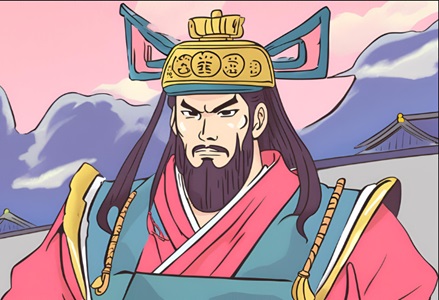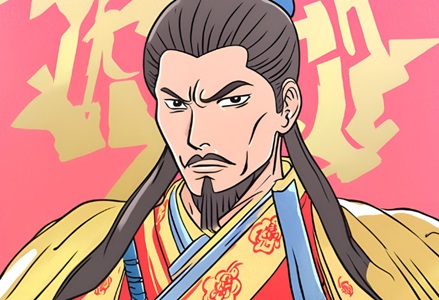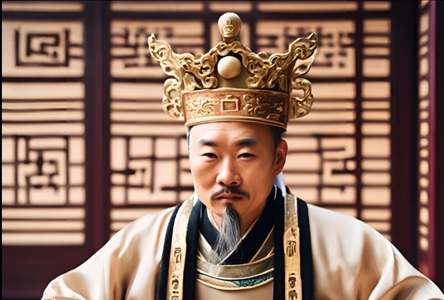Title of Biography in Chinese, Pinyin: 汉武帝传 (Hàn wǔdì Zhuàn).
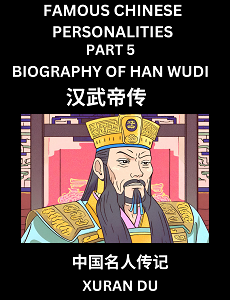
Title of Biography in English: The Biography of Emperor Wu of Han.
Check out books on my Amazon and Barnes & Noble homepages as well as the following pages to learn Biographies of famous Chinese personalities-
- Part 1 – Chinese Biography Book Series for Beginners
- Part 2 – Chinese Biography Book Series for Beginners
- Part 3 – Chinese Biography Book Series for Beginners
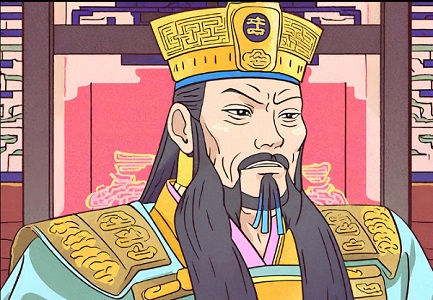
The Biography of Emperor Wu of Han in English (英文传记)
Emperor Wu of Han: An Unparalleled Emperor, Dominating All Corners
Emperor Wu of Han, Liu Che, the seventh emperor of the Western Han Dynasty, is renowned as “An Unparalleled Emperor” due to his great talents and profound influence. During his reign, he strengthened central authority, implemented reforms, and brought prosperity to the Han Dynasty. Externally, he expanded the territory and actively communicated with neighboring ethnic groups and countries, greatly expanding the Han Dynasty’s territory.

In politics, Emperor Wu implemented the “Law of Enfeoffment” to weaken the power of feudal princes and strengthen central authority. He put talented officials such as Gongsun Hong and Dong Zhongshu into important position, who made significant contributions to the prosperity and stability of the Han Dynasty. At the same time, he established the “Inspector” system to strengthen the supervision of local officials and ensure smooth implementation of policies.
Economically, Emperor Wu attached great importance to agricultural production, promoting advanced farming techniques such as the “Daitian Method” to increase grain yield. He also built water conservancy projects and developed irrigated agriculture, laying a solid foundation for the economic prosperity of the Han Dynasty. Additionally, he encouraged the development of industry and commerce, promoting the prosperity of the commodity economy.
In culture, Emperor Wu adopted Dong Zhongshu’s suggestion and implemented the policy of “rejecting all other schools of thought and upholding Confucianism alone,” establishing the orthodox status of Confucianism. He established the Imperial University and selected talents, making significant contributions to the cultural prosperity of the Han Dynasty.
In military affairs, Emperor Wu sent Zhang Qian as an envoy to the Western Regions, pioneering the Silk Road and strengthening ties between the Han Dynasty and Western countries. He sent troops to attack the Xiongnu multiple times, stabilizing the northern border and expanding the Han Dynasty’s territory. Additionally, he suppressed rebellions in the southern Yue and southwestern Yi regions, consolidating the unity of the Han Dynasty.

However, during Emperor Wu’s reign, there were also issues such as continuous wars that led to a depleted imperial treasury and increased burdens on the common people.
Learn Biography Of Emperor Wu of Han in Chinese (汉武帝的详细传记)
汉武帝:千古一帝,威震四方
汉武帝刘彻,是西汉的第七位皇帝,以其雄才大略和深远影响被后世誉为“千古一帝”。他统治期间,对内强化中央集权,推行改革,使汉朝国力强盛;对外则开疆拓土,积极与周边民族和国家交流,扩大了汉朝的疆域。
在政治上,汉武帝实行“推恩令”,削弱诸侯王的权力,加强中央集权。他重用贤能之士,如公孙弘、董仲舒等,为汉朝的繁荣稳定立下赫赫功绩。同时,他设立“刺史”制度,加强对地方官员的监察,确保政令畅通。

在经济上,汉武帝重视农业生产,推行“代田法”等先进耕作技术,提高粮食产量。他还兴修水利,发展灌溉农业,为汉朝的经济繁荣奠定了坚实基础。此外,他鼓励工商业发展,促进了商品经济的繁荣。
在文化上,汉武帝采纳董仲舒的建议,实行“罢黜百家,独尊儒术”的政策,确立了儒家思想的正统地位。他兴办太学,选拔人才,为汉朝的文化繁荣做出了巨大贡献。
在军事上,汉武帝派遣张骞出使西域,开辟了丝绸之路,加强了汉朝与西域各国的联系。他多次派兵出征匈奴,稳定了北部边疆,扩大了汉朝的疆域。此外,他还平定了南越、西南夷等边疆地区的叛乱,巩固了汉朝的统一。
然而,汉武帝在位期间也存在一些问题,如连年征战导致国库空虚、百姓负担加重等。晚年时,他下诏罪己,反思自己的过失,试图挽救汉朝的颓势。
Emperor Wu of Han Biography Keywords- English, Chinese & Pinyin (关键词)

- 汉武帝(Hàn wǔdì , Han Wu Di): The seventh emperor of the Western Han Dynasty, renowned for his great talents and profound influence.
- 千古一帝(Qiāngǔ yī dì, An Unparalleled Emperor): The Greatest Emperor, An emperor whose achievements and influence are unparalleled throughout history.
- 推恩令(Tuī ēn lìng, Law of Enfeoffment): A policy implemented by Emperor Wu to weaken the power of feudal princes and strengthen central authority.
- 丝绸之路(Sīchóu zhī lù, Silk Road): An ancient trade route connecting China with the West, pioneered by Zhang Qian during Emperor Wu’s reign.
Pinyin of Emperor Wu of Han Biography (汉武帝传记的拼音)
Hàn wǔdì: Qiāngǔ yī dì, wēi zhèn sìfāng

hàn wǔdì liúchè, shì xīhàn de dì qī wèi huángdì, yǐ qí xióngcáidàlüè hé shēnyuǎn yǐngxiǎng bèi hòushì yù wèi “qiāngǔ yī dì”. Tā tǒngzhì qíjiān, duì nèi qiánghuà zhōngyāng jíquán, tuīxíng gǎigé, shǐ hàn cháo guólì qiángshèng; duìwài zé kāi jiāng tà tǔ, jījí yǔ zhōubiān mínzú hé guójiā jiāoliú, kuòdàle hàn cháo de jiāngyù.
Zài zhèngzhì shàng, hàn wǔdì shíxíng “tuī ēn lìng”, xuēruò zhūhóu wáng de quánlì, jiāqiáng zhōngyāng jíquán. Tā zhòngyòng xiánnéng zhī shì, rú gōngsūn hóng, dǒngzhòngshū děng, wèi hàn cháo de fánróng wěndìng lì xià hèhè gōngjī. Tóngshí, tā shèlì “cìshǐ” zhìdù, jiāqiáng duì dìfāng guānyuán de jiānchá, quèbǎo zhènglìng chàngtōng.
Zài jīngjì shàng, hàn wǔdì zhòngshì nóngyè shēngchǎn, tuīxíng “dàitián fǎ” děng xiānjìn gēngzuò jìshù, tígāo liángshí chǎnliàng. Tā hái xīngxiū shuǐlì, fāzhǎn guàngài nóngyè, wèi hàn cháo de jīngjì fánróng diàndìngle jiānshí jīchǔ. Cǐwài, tā gǔlì gōngshāngyè fāzhǎn, cùjìnle shāngpǐn jīngjì de fánróng.
Zài wénhuà shàng, hàn wǔdì cǎinà dǒngzhòngshū de jiànyì, shíxíng “bàchù bǎi jiā, dú zūn rúshù” de zhèngcè, quèlìle rújiā sīxiǎng de zhèngtǒng dìwèi. Tā xīngbàn tài xué, xuǎnbá réncái, wèi hàn cháo de wénhuà fánróng zuò chūle jùdà gòngxiàn.

Zài jūnshì shàng, hàn wǔdì pàiqiǎn zhāngqiān chū shǐ xīyù, kāipìle sīchóu zhī lù, jiāqiángle hàn cháo yǔ xīyù gèguó de liánxì. Tā duō cì pàibīng chūzhēng xiōngnú, wěndìngle běibù biānjiāng, kuòdàle hàn cháo de jiāngyù. Cǐwài, tā hái píngdìngle nányuè, xīnán yí děng biānjiāng dìqū de pànluàn, gǒnggùle hàn cháo de tǒngyī.
Rán’ér, hàn wǔdì zài wèi qíjiān yě cúnzài yīxiē wèntí, rú liánnián zhēngzhàn dǎozhì guókù kōngxū, bǎixìng fùdān jiāzhòng děng. Wǎnnián shí, tā xià zhào zuì jǐ, fǎnsī zìjǐ de guòshī, shìtú wǎnjiù hàn cháo de tuíshì.
